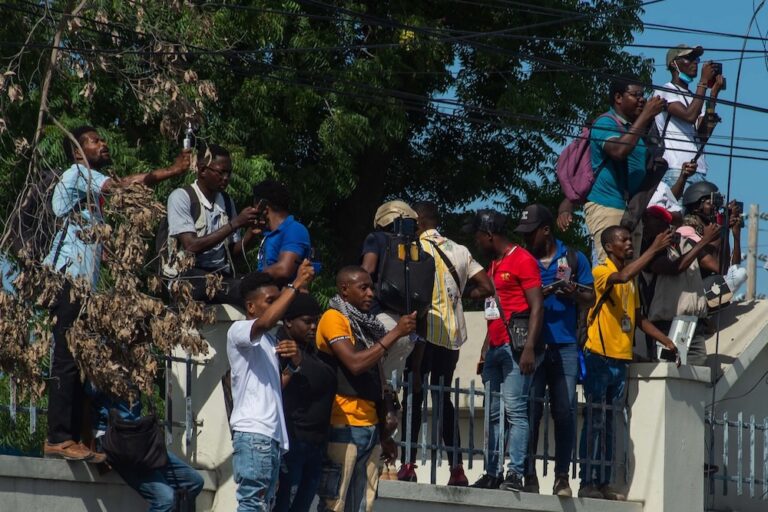(RSF/IFEX) – RSF has condemned the entrenched impunity in the case of Haitian journalist Brignol Lindor, of provincial radio station Echo 2000. On 2 December 2001, the journalist was stoned and hacked to death by ruling party supporters in the town where he worked, Petit-Goâve. “The murderers of journalists lay down the law in Haiti,” […]
(RSF/IFEX) – RSF has condemned the entrenched impunity in the case of Haitian journalist Brignol Lindor, of provincial radio station Echo 2000. On 2 December 2001, the journalist was stoned and hacked to death by ruling party supporters in the town where he worked, Petit-Goâve.
“The murderers of journalists lay down the law in Haiti,” RSF Secretary-General Robert Ménard said. “Lindor’s family was forced to leave the country because of threats in April 2001. The family of Géraud Louis, the victim’s cousin, has since had to go into exile, as has Arbrun Alezi, Echo 2000’s director, because of threats said to have come from government supporters,” Ménard added.
According to RSF, there has been no progress in the case since the investigating judge issued his conclusions in September 2002. “On the contrary, this year’s decision by the Haitian courts not to recognise the Lindor family as a civil party in the case has contributed to the impunity, as it deprives the family of its legitimate right to appeal against the investigating judge’s controversial conclusions,” the organisation said.
“We are still suffering but we will not give up until light is shed on this hateful crime,” the Lindor family said, speaking in Paris, where it has obtained political asylum. The family welcomed the sanctions adopted by France and other European governments against the Haitian authorities, urging them to go further by refusing visas to President Jean-Bertrand Aristide and several members of his government.
French members of parliament expressed their solidarity with the Lindor family on the second anniversary of the journalist’s death. On 3 December 2003, the family was invited to the Senate by Senator Michel Dreyfus-Schmidt, the president of the France-Caribbean Friendship Group. Member of Parliament Edouard Landrain, president of the France-Haiti Friendship Group, also arranged a meeting with RSF and Moréno Lindor, the victim’s younger brother, in the National Assembly to discuss press freedom in Haiti.
On 31 August, Simone Louis, the wife of Brignol Lindor’s cousin, left Haiti with her children Samora, Rachelle, Dodell and Uriel for France, where they have been granted political asylum. Her husband Géraud Louis went to the scene of the murder shortly after it took place to recover the journalist’s body. Thereafter, the family was the target of repeated threats and acts of intimidation. There was an attempt to set their house on fire, shots were fired at the house, Aristide posters were placed on the walls, and they were threatened by armed individuals. The family identified persons nicknamed “Ti Harry”, “Ti Yayan”, “Baboute”, “Haugou” and “Valmy Colbert” as being among the perpetrators of the threats, but no action was taken against them. Former Echo 2000 director Alezi also went into exile in August after receiving threats.
Earlier this year, the Port-au-Prince Appeals Court rejected an appeal by Moréno Lindor and the victim’s father, Belosier Lindor, challenging the investigating judge’s conclusions and calling for the investigation to be reopened. On 27 March, the court ruled that the appeal could not be heard because the journalist’s family members have not been formally recognised as civil parties in the case.
The family’s lawyer, Jean-Joseph Exumé, has appealed against the ruling to the Court of Cassation on the grounds that, in Haitian law, civil parties do not have to be formally constituted in cases when an investigation is opened at the Public Prosecutor’s initiative. “The appeal to the Court of Cassation has still not been heard,” Exumé complained. He also said he had no information as to whether any of the accused were in prison.
In his conclusions, issued on 16 September 2002, the investigating judge charged 10 persons with participating in the murder but did not charge former Petit-Goâve deputy mayor Dumay Bony. Bony had called for “zero tolerance” to be applied to “terrorist” Brignol Lindor, two days after Lindor invited members of the opposition to take part in his radio programme, “Dialogue”. The journalist was killed three days later.
The term “zero tolerance” is widely viewed in Haiti as an implicit legitimisation of lynching. After President Aristide called on the police to use “zero tolerance” in their handling of criminals, there was an increase in extra-judicial executions in the country.
Lindor was stoned and hacked to death with machetes on 3 December 2001 by members of Dòmi Nan Bwa, a local group of grassroots supporters of the ruling Fanmi Lavalas party. They claimed responsibility for the killing shortly afterwards in the presence of Guyler Delva, the head of the Association of Haitian Journalists (AJH).


